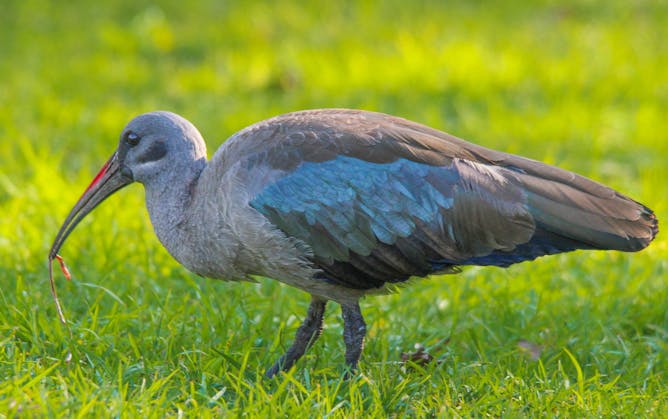|
Some may consider them to be ugly and their raucous cries can be unsettling. But the hadeda ibis has a superpower. Carla Jacquelyn du Toit unpacks the latest research showing that these birds – a common sight in countries ranging from South Africa to Kenya, Sudan and Ethiopia – have a “sixth sense” of remote-touch that enables them to detect vibrations in the soil, locating worms and other invertebrates they eat. The research also shows that they need moist soil for this sense to work, an insight that suggests hadedas, and other wading birds, could be threatened by extended droughts and the loss of wetlands.
Former South African president Jacob Zuma caused a stir in December when he announced he’d campaign for a new political party, a rival to the ruling African National Congress (ANC). Zuma had been a member of the ANC for over 60 years and its president from 2007 to 2017. Mashupye Herbert Maserumule explains what the uMkhonto weSizwe party is about and its prospects in the upcoming elections.
|

Carla Jacquelyn du Toit, University of Cambridge
Africa’s hadeda ibises can sense vibrations using a special sensory organ in their beaks. But they need moist soil for it to work.
|

Mashupye Herbert Maserumule, Tshwane University of Technology
Opinion polls show that the uMkhonto weSizwe party enjoys significant support in KwaZulu-Natal, Jacob Zuma’s home province.
|

Seth Asare Okyere, University of Arizona; Daniel Oviedo, UCL; Louis Kusi Frimpong, University of Environment and Sustainable Development ; Matthew Abunyewah, Charles Darwin University; Stephen Leonard Mensah, University of Memphis
Walking is a common way of getting around in most African cities
|

Frans Viljoen, University of Pretoria
While some opposition is to be expected, indications are that the general Zimbabwean public will take the government’s lead on abolition.
|
From our international editions
|
-
Shahram Akbarzadeh, Deakin University
The United States and Israel are gifting Iran and its message of defiance enormous appeal, well beyond the imagination of Iranian authorities.
-
Katrina Burgess, Tufts University
Donald Trump says he will authorize a roundup of all 11 million undocumented immigrants in the country. A 1950s program with similar goals, called Operation Wetback, offers lessons.
-
Eryn Cangi, University of Colorado Boulder
Studying Venus’ water loss can help scientists better understand how planets go from potentially habitable to incapable of supporting life.
-
David Murakami Wood, L’Université d’Ottawa/University of Ottawa
The scaling back of Saudi Arabia’s colossal Line project from a 170 km long linear city to only 2.4 km is a clear warning to the viability of other urban mega-projects in a warming world.
-
Kevin Foster, Monash University
In his new history, Amitav Ghosh shows how the world’s first international drug cartels were run by the Dutch and British governments through their monopoly East India companies.
|
|